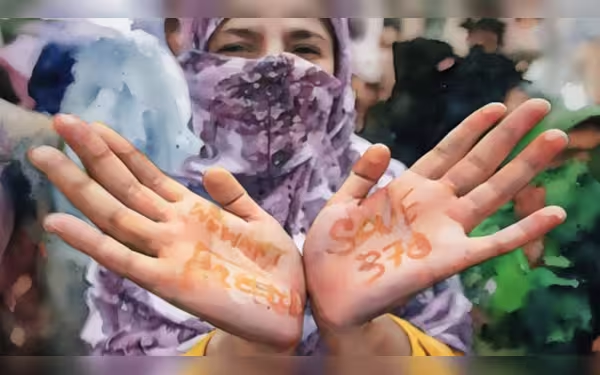Thursday, December 26, 2024 07:11 PM
Kashmir Voices Ignored Amid Rising Tensions
- Crackdown on dissent in Azad Jammu and Kashmir.
- Indian assembly calls for restoration of special status.
- Kashmiri leaders criticize suppression of political voices.
 Image Credits: thefridaytimes
Image Credits: thefridaytimesThe article discusses the suppression of Kashmiri voices amid rising tensions in Kashmir, highlighting calls for restoration of special status.
The ongoing conflict in Kashmir has long been a source of tension between Pakistan and India, with both nations often sidelining the voices of the Kashmiri people. Recently, the situation has escalated, particularly in Azad Jammu and Kashmir (AJK), where authorities have cracked down on dissenting voices. This crackdown is not an isolated incident; it marks the second significant attempt to suppress protests in AJK in a short span of time. The authorities seem unwilling to tolerate any opposition to their policies, raising concerns about the state of democracy in the region.
In India, the situation is equally troubling. Democratic forces in Indian-held Kashmir have faced severe repression, while extremist elements have received support from the Indian government. Secular Kashmiri nationalist leaders have voiced their concerns, claiming that the Indian government has manipulated the political landscape by allowing former militants to contest elections. Despite these efforts, the National Conference, led by Farooq Abdullah, managed to secure a majority in the state assembly, indicating a strong desire among the Kashmiri people for a return to democratic norms.
Recently, the assembly in Indian-held Kashmir passed a resolution calling for the restoration of the special status that was revoked in 2019. This resolution, supported by all parties except the ruling BJP, emphasizes the importance of constitutional guarantees that protect the identity and rights of the Kashmiri people. The resolution urges the Indian government to engage in dialogue with elected representatives to restore these provisions, highlighting a collective desire for peace and stability in the region.
However, the abrogation of Article 370 has alienated many Kashmiri leaders, even those who sought greater autonomy within the Indian framework. This has led to a perception that the Indian government is attempting to alter the region's demographics, further fueling tensions. The support for the recent resolution from various Indian political parties suggests a willingness to seek a peaceful resolution to the Kashmir dispute, which has historically been a flashpoint for conflict between India and Pakistan.
On the Pakistani side, there is also a growing concern about the treatment of Kashmiri voices. Leaders from AJK have criticized the Pakistani government for its heavy-handed tactics in suppressing protests and dissent. For instance, Dr. Tauqeer Gilani, a prominent figure in the Jammu Kashmir Liberation Front, was forced to flee after facing false accusations and threats from extremists. This situation raises questions about the rights of Kashmiri people in what is often referred to as Pakistan-occupied Kashmir.
It is crucial for both Pakistan and India to listen to the voices of Kashmiri political parties advocating for a peaceful resolution to the long-standing conflict. Ignoring these voices only strengthens militant groups and perpetuates a cycle of violence that has led to numerous conflicts in the past. Engaging in dialogue with leaders like Yasin Malik and removing restrictive conditions for political participation in AJK could pave the way for a more inclusive and peaceful approach to the Kashmir issue.
Ultimately, the path to peace in Kashmir lies in recognizing the legitimate aspirations of its people. Both nations must prioritize dialogue and respect for democratic norms to create an environment conducive to resolving this complex dispute. By doing so, they can work towards a future where the voices of the Kashmiri people are heard and respected, fostering a sense of unity and understanding that has been sorely lacking in the region.













